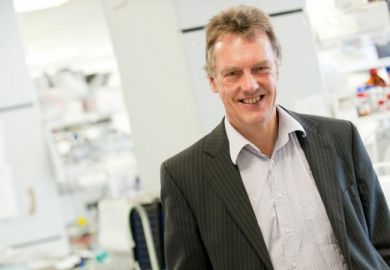Gregg Semenza, a Johns Hopkins University professor of genetic medicine who shared the 2019 Nobel Prize in Physiology or Medicine, has retracted another published paper amid a growing number of cases involving suspicions of image manipulation.
Professor Semenza now has a total of at least seven retractions, and a greater number of papers with corrections or expressions of concern, after the withdrawal of his 2011 paper in the journal Oncogene.
While top scientists and even Nobel laureates have had retractions in the past, the rising count and the consistent reason – characteristics of images that suggest possible data manipulation – have been bringing Professor Semenza a rising chorus of critics, along with some defenders.
One of the two other scientists who shared the 2019 Nobel with Professor Semenza – William Kaelin, a professor of medicine at Harvard University – offered a mix of both. Professor Semenza may have made mistakes in his career after his work that earned him the Nobel, but the prizewinning contributions themselves do not appear to be implicated in the retractions, Professor Kaelin said.
“These papers that are being retracted now are from a different era and different area of biology,” Professor Kaelin told Times Higher Education. “It’s an unhappy situation, but at least none of the work that led to the Nobel prize is affected.”
Professor Semenza, Professor Kaelin and a third researcher, Sir Peter Ratcliffe, now director of clinical research at the Francis Crick Institute in London, split the 2019 Nobel for separate work that they each did independently on the ways that cells sense and adapt to oxygen availability.
Professor Semenza deserves enduring credit for several groundbreaking accomplishments, Professor Kaelin said, led by his cloning of the gene that encodes the protein now known as HIF-1α, which plays a key role in the body’s response to low oxygen levels. That work also won Professor Semenza the 2016 Lasker Award for basic medical research.
It appears, Professor Kaelin said, that the problems driving the retractions involve subsequent attempts to extend his discoveries into the world of cancers.
“Where he got into trouble – and I don’t want to go too deep into this – but once he started really trying to push the idea that HIF was a great target in cancer and we should be targeting HIF-1 in cancer,” Professor Kaelin told THE. “And he was frankly doing a lot of cancer biology and cancer pharmacology studies, [which] is where things sort of, I think, derailed.”
The Semenza retractions have attracted a great deal of attention on online platforms for scientific exchange, with some experts describing them as falling within the range of normal for a scientist with an extensive publication history, and others suggesting the repeated image-related issues deserve fundamental scepticism about intent.
The 2011 article in Oncogene – part of the Nature family of journals – had 15 co-authors, most of whom agreed to its retraction, including Professor Semenza. Only one co-author disagreed.
A Johns Hopkins Medicine spokeswoman said that the university “take[s] allegations of research impropriety seriously, and we have strict protocols and processes in place to vet any such allegations and to determine an appropriate path forward, if necessary”.
“Due to federal confidentiality laws, we cannot disclose details of these review processes. We recognise that journals maintain their own processes for review and retraction, and we defer to them for comment on their processes,” the spokeswoman said.
Register to continue
Why register?
- Registration is free and only takes a moment
- Once registered, you can read 3 articles a month
- Sign up for our newsletter
Subscribe
Or subscribe for unlimited access to:
- Unlimited access to news, views, insights & reviews
- Digital editions
- Digital access to THE’s university and college rankings analysis
Already registered or a current subscriber? Login








